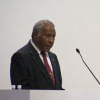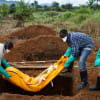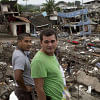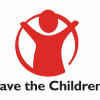Progress made, challenges there
Bangladesh has made the highest progress in the South Asian region in terms of ensuring safe and happy childhoods, but inclusive education remains elusive, according to a report by Save the Children.
The country has ranked 130th this year among 175 nations across the world in the second End of Childhood index.
The index was prepared by Save the Children on the basis of progress made to ensure an environment conducive to all children growing up and reaching their highest potential.
The second annual report, titled “The Many Faces of Exclusion”, was released yesterday at the Jatiya Press Club in the capital on the eve of International Children's Day.
The report said poverty, conflict and discrimination against girls were putting 1.2 billion children -- more than half of the children worldwide -- at risk for an early end to their childhood.
The indicators used to compare countries in the index are -- poor health, malnutrition, exclusion from education, child labour, child marriage, early pregnancy and extreme violence.
The report said, “These 'childhood enders' are most prevalent where poverty, conflict and gender bias overlap to create toxic environments for children”.
For instance, it pointed out that in Bangladesh more than 20 percent of adolescent girls, aged 15 to 19, report having experienced forced sex, another critical “childhood ender”.
Bangladesh's score in the index improved by 21 points to 701 on a scale of 1 to 1,000 from last year, “mostly by getting more children into school”.
But a significant gap between the enrolment rate and the completion rate exists, the report said.
In just 12 months, Bangladesh's rate of out-of-school children has been reduced by a remarkable 27 percent, and by 36 percent over the last five years, according to Unesco.
The report said South Asia has achieved gender parity as a whole and added, “Bangladesh, India and Nepal now have many more girls than boys in school”.
However, quality education is a major issue across the varying levels and layers of the education system here.
Besides, children with disabilities are the worst victims of discrimination, with less than 20 percent having access to education.
Other factors such as poverty, geo-location, social exclusion and poor teaching quality, have also resulted in children being excluded from the formal education system.
The report shows more than four million children, one-fifth of those in the 6-10 age group, are out of school despite significant gains in primary education.
Like Bangladesh, 94 other nations have made meaningful developments in favour of children.
Many of them are relatively poor countries, showing that “political choices can matter more than national wealth”.
Singapore and Slovenia are the joint first top countries in the index, scoring 987. Eight of the 10 least performing countries are from West and Central Africa.
The US, Russia and China -- three of the most powerful nations in the world in terms of their economic, military and technological strength -- lag behind most of Western Europe in helping children reach their full potential.
The report also identified 10 key trends that require attention, including rising adolescent pregnancies and rates of marriage for girls under 18, an increasing gap between rich and poor countries, worsening survival rates in sub-Saharan Africa, child labour and stalled efforts to increase education worldwide, along with the huge number of displaced people worldwide.
At the report launching ceremony, Reefat Bin Sattar, Save the Children's director of program development and quality, said while the report showed major progress done, not all groups were reaping the benefits.

 For all latest news, follow The Daily Star's Google News channel.
For all latest news, follow The Daily Star's Google News channel. 








Comments